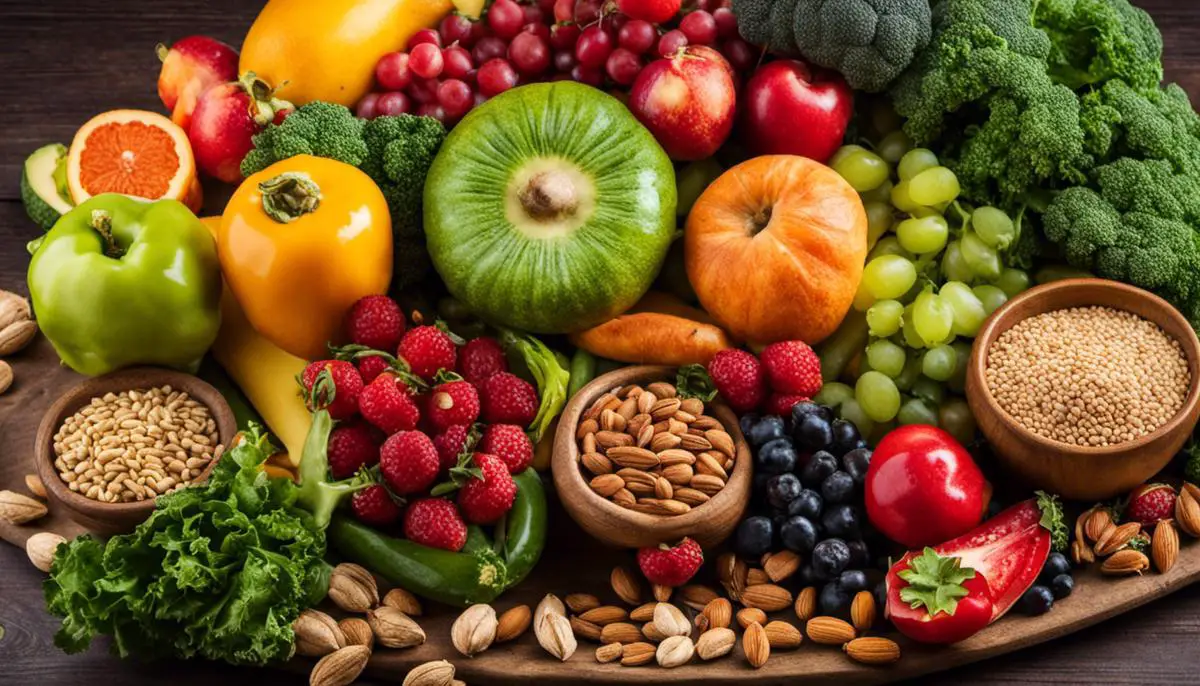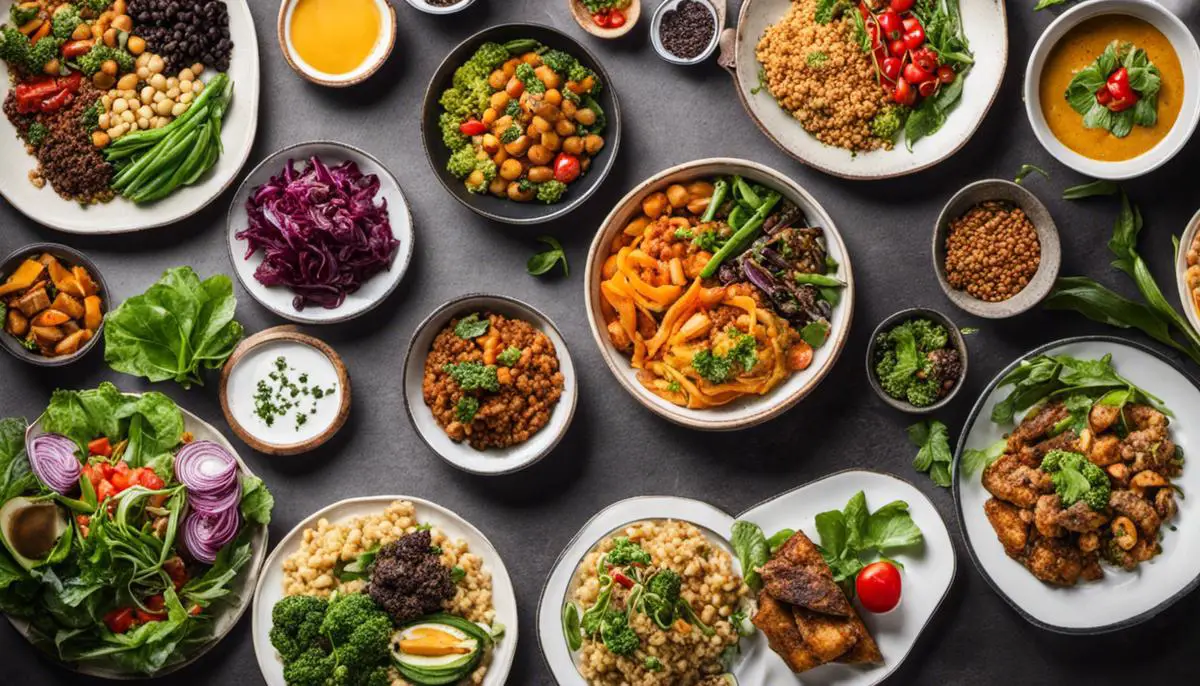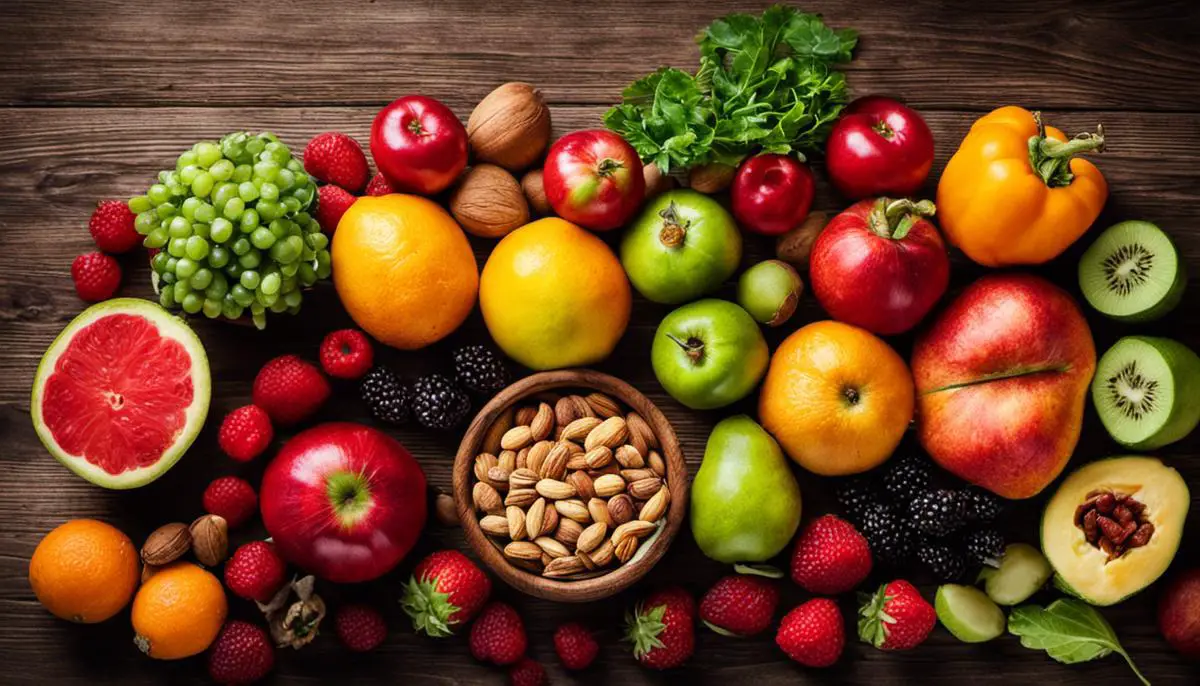Veganism, a lifestyle that has rapidly gained traction in recent years, is often surrounded by a myriad of misconceptions and debates. This lifestyle, which advocates for the complete elimination of animal products from one’s diet, is chosen for various reasons, be they ethical, environmental, or health-related. This immersive exploration into the world of veganism serves to provide an in-depth understanding of its essence, nutritional implications, associated health benefits, potential risks, and practical tips for embracing this lifestyle. By delving into the science and reality of veganism, we aim to cut through popular assumptions and reveal the truths behind this revered dietary regimen.
Understanding Veganism
Veganism is a dietary and lifestyle choice that eliminates the use of animal products in all forms. This not only includes meat, fish, and poultry but also extends to dairy products, eggs, honey, and any other product derived from animals. Many vegans also avoid non-food items made from animals, such as leather, fur, wool, and silk, as well as products tested on animals.
While the term “vegan” was coined in 1944 by Donald Watson, co-founder of The Vegan Society, the practice can be traced back over 2,000 years. The concept of non-violence towards animals in diet and lifestyle was embraced in various ancient Indian and Mediterranean societies. The modern vegan movement, however, began in the 20th century, fueled by increasing awareness of animal rights and environmental issues.
Ethics is a primary motivation for many vegans. They believe that animals have a right to live free from suffering and exploitation by humans. Modern farming practices often involve cramming animals into tiny spaces, which can lead to health issues and emotional distress. Vegans argue that it’s unnecessary to consume animal products in a world where plant-based options abound. By choosing veganism, these individuals take a stand against animal cruelty and exploitation.
Veganism is also frequently pursued out of concern for the environment. Animal agriculture contributes to greenhouse gas emissions, deforestation, water pollution, and land degradation. To produce a pound of beef, for example, requires thousands more water than producing the same amount of plant proteins. By choosing a plant-based diet, individuals can significantly reduce their carbon footprint and contribute to a more sustainable food system.
Vegan diets, when well-planned, are nutritionally adequate and can provide health benefits in the prevention and treatment of certain diseases. As per the American Dietetic Association, vegan diets are often higher in dietary fiber, magnesium, folic acid, vitamins C and E, iron, and phytochemicals, and they tend to be lower in calories, saturated fat, and cholesterol than non-vegan diets. They can help in weight loss and may reduce the risk of heart disease, high blood pressure, type 2 diabetes, and certain types of cancer.
However, it’s crucial to note that not all vegan diets are created equal. Oreos and French fries may be vegan, but they certainly are not healthy foods. A balanced, varied vegan diet emphasizing whole grains, fruits, vegetables, legumes, nuts, and seeds is key to reaping the potential health benefits.
A vegan diet, while very healthy, does require careful planning to ward off potential nutritional deficiencies. Key nutrients of concern include vitamin B12, vitamin D, omega-3 fatty acids, iodine, iron, calcium, and zinc. These nutrients are all available in plant foods, but in different amounts, forms, or with varying bioavailability compared to animal sources. Supplementation is often recommended, particularly for B12 which is essentially only found naturally in animal foods.
To summarize, adopting a vegan lifestyle goes beyond merely excluding certain food groups—it represents an integrated choice driven by diverse motivations, such as ethical concerns, environmental responsibility, and health considerations. By choosing this practice, one espouses a compassionate lifestyle aimed at minimizing animal suffering and environmental degradation. Furthermore, when executed correctly, veganism can present several potential health advantages.

Nutritional Elements of a Vegan Diet
Diving Deeper into the Nutritional Components of a Vegan Diet
Vegan dietary plans reject all animal-based products, including meat, dairy items, eggs, and honey. As a result, some might worry about obtaining adequate nutritional content. But, with meticulous planning, a vegan regime can supply all the nutrients needed for optimal health. Dietary staples for vegans encompass a rich variety of fruits, vegetables, whole-grain foods, nuts, and legumes. Each of these classes brings an array of choices to the table, resulting in a diverse and nutrient-packed plant-centric dietary regimen.
Fruits and Vegetables
Fruits and vegetables are simple foundation elements of a vegan diet. They are rich sources of vital nutrients such as fiber, vitamin C, folate, and potassium. Including a variety of colorful vegetables and fruits in your diet not only ensures you get a broad spectrum of nutrients but also promotes heart health by reducing blood pressure and cholesterol levels.
Whole Grains
Whole grains, such as brown rice, oats, and whole-grain bread, are crucial sources of carbohydrates, protein, fiber, and various vitamins and minerals. Consuming whole grains instead of refined grains ensures that you get all parts of the grain including the bran, germ, and endosperm, meaning you’ll get more nutrients including B vitamins, antioxidants, and trace minerals like iron, zinc, copper, and magnesium.
Nuts and Legumes
Nuts and legumes serve as particularly important sources of protein for vegans, alongside significant quantities of fiber, vitamins, and minerals. Almonds, peanuts, and cashews, for instance, are not only high in protein but also rich in heart-healthy monounsaturated fat. On the other hand, legumes like lentils, chickpeas, and beans are excellent sources of fiber, iron, and B vitamins.
Balancing Nutrition in a Vegan Diet
Balancing nutrition when on a vegan diet involves strategic food combinations to ensure you receive all the necessary protein, vitamins, and minerals. For example, combining legumes with grains can provide complete protein, which is crucial for tissue repair and growth.
Key Vegan Sources of Protein, Vitamins, and Minerals
While a general perception exists that obtaining enough protein on a vegan diet is difficult, this is not the case with careful meal planning. Green peas, quinoa, lentils, chickpeas, and seitan are just a few vegan foods rich in protein.
Meanwhile, fortified foods like plant milks and breakfast cereals, and sunlight exposure can provide Vitamin D. Vitamin B12, which is important for nerve function, can be obtained from fortified foods and supplements. Omega-3 fatty acids, crucial for cognitive function and cardiovascular health, are available in flax seeds, chia seeds, hemp seeds, and walnuts.
For minerals like calcium and iron, leafy green vegetables, legumes, and fortified foods are excellent sources. Pairing iron-rich foods with vitamin C-rich foods boosts iron absorption, which is particularly important as the bioavailability of iron from plant sources is lower than that from animal sources.
While becoming vegan may seem daunting, with thoughtful planning and a little understanding one can ensure their dietary needs are fully met through a vegan diet. This diet offers not only a diverse and refreshing meal plan but numerous health benefits too.

Health Benefits and Risks of Veganism
The Positive Impact on Health from a Vegan Diet
One of the primary health benefits of transitioning to a vegan diet includes weight management—with many experiencing weight loss, even without changes to exercise or portion control. This can largely be attributed to the high fiber content in a vegan diet that tends to make one feel satisfied quicker, leading to fewer calories consumed overall.
This plant-based diet can have a significant positive impact on cardiovascular health. The reason is that vegan diets usually have zero cholesterol and low levels of saturated fats, both known culprits of heart disease. Furthermore, antioxidants are plentiful in a vegan diet thanks to the abundant fruits and vegetables, helping to protect against cellular damage and illness.
A vegan diet is rich in high fiber foods that have been proven to support in keeping diabetes at bay by regulating blood sugar levels and minimizing insulin spikes. Besides, a diet high in vegetables and fruits also helps to ward off certain types of cancer, including breast and colon cancer.
Understanding Vegan Nutrition and Dealing with Potential Deficiencies
Transitioning to a vegan diet is not automatically synonymous with a healthier lifestyle. It requires careful meal planning to prevent possible nutrient deficiencies.
For instance, Vitamin B12, primarily found in animal products, is often lacking in a vegan diet. This nutrient plays a key role in nerve function, as well as in the production of red blood cells and DNA. To compensate for this, vegans should consider consuming B12-fortified foods such as soy products, plant milk, and breakfast cereals, or even take B12 supplements.
A vegan diet may also lack sufficient Omega-3 fatty acids, as these nutrients commonly come from eggs and fatty fish. These essential fatty acids contribute to brain health and may assist in reducing heart disease and inflammation risks. However, vegans can source omega-3 fatty acids from a variety of plant-based options like flaxseeds, walnuts, chia seeds, hemp seeds, and even algae supplements.
The risk of iron deficiency is also higher in a vegan diet, due to the absence of meat. Iron is important for creating blood cells and enabling oxygen transport. Plant-based iron sources include lentils, chickpeas, tofu, quinoa, spinach, chia hemp seeds, and fortified breakfast cereals. Do note, however, that plant-based iron may not be as easily absorbed by the body compared to iron from meat sources. Consuming iron-rich foods alongside vitamin-C-rich foods can help improve iron absorption.
Lastly, maintaining an adequate intake of protein, an essential nutrient for body repair and maintenance, is also crucial in a vegan diet. Despite the presence of protein in many plant foods, these often fall short of providing complete proteins, as do animal products. A varied vegan diet that incorporates grains, legumes, nuts, seeds, and vegetables should meet complete protein requirements.

Practical Tips for a Successful Vegan Diet
Navigating the Transition to a Vegan Diet
Transitioning to a vegan diet involves removing all animal products and derivatives from your diet – this includes products such as meat, dairy, eggs, and other animal-derived ingredients. Simultaneously, it encourages the increased consumption of fruits, vegetables, whole grains, nuts, and seeds, all of which form the foundation of a balanced, nutrient-rich vegan diet.
The Art of Meal Planning
Meal planning equates to a higher likelihood of adhering to your vegan diet. However, knowing what to cook can be daunting for first-time vegans. Starting basics are grains (rice, quinoa, barley, etc.), protein (tofu, seitan, lentils, chickpeas, etc.), and vegetables. Use these elements to build your meals. Therefore, it may look like quinoa with stir-fried tofu and vegetables, or lentil curry served with rice.
Shopping Tips for New Vegans
Running errands as a vegan involves a level of conscientiousness not usually required. When shopping for groceries, prioritize fresh fruits, vegetables, grains, and plant-based proteins. Avoid products packaged in a way that obscures what’s inside. Jars and cans of beans, tomato sauce, or vegetables are also good choices. Additionally, there are also plenty of vegan-friendly snacks available, including fruit, nuts, seeds, and even some types of chips and cookies.
Vegan Food Labels: Decoding the Mystery
Food labels are vital to avoid accidentally ingesting animal products. Products labeled “vegan” or “suitable for vegans” are safe. However, you’ll also need to recognize ingredients derived from animals but disguised under scientific names. Gelatin (from animal bones), casein & whey (from milk), and cochineal (from beetles) are a few to watch out for. Some breads use L-cysteine (from feathers or human hair) as a softening agent.
Introducing Vegan Recipes
Adopting vegan recipes could be as simple as swapping out animal products for plant-based alternatives in your favorite dishes. For instance, use tofu or seitan instead of meat, or almond milk instead of cow’s milk. There’s an abundance of vegan cookbooks and online recipe blogs available to inspire and help you along this journey.
Dealing with Social Situations
Social situations can challenge your adherence to a vegan diet. To navigate such scenarios, always communicate your dietary preferences to your host beforehand. If attending a potluck, bringing your vegan dish ensures you have something to eat, and it’s also a great way of introducing others to vegan cuisine.
Embracing Veganism Beyond Your Home
Adapting to a vegan diet when you’re not at home may seem like a challenge, but it’s certainly achievable. When dining out, always verify if the restaurant offers a vegan menu or if dishes can be tweaked to meet vegan standards. In case of confusion, choosing a salad or dish primarily containing vegetables is typically a reliable option. Additionally, the availability of pre-packaged vegan food options in supermarkets and corner stores is on the rise, further simplifying the process.

Dispelling the Myths: Veganism Debunked
Dispelling the Myth: Vegan Diets are Not Necessarily Costly
Many believe that choosing a vegan diet will inevitably lead to a steep increase in their grocery bill. However, this isn’t necessarily true. Essential components of a vegan diet like grains, lentils, beans, fruits, and veggies are typically less expensive than animal-based products like meat and dairy. Undeniably, specialty items such as vegan cheese or meat substitutes and upscale brands can inflate costs, but these are not mandatory for maintaining a balanced vegan diet. A study from the Journal of Hunger & Environmental Nutrition found that individuals adhering to plant-based diets could potentially save around $750 annually compared to those who consume diets including meat.
Misconception: Vegan Diets are Restrictive
One common misconception about veganism is that it is a restrictive diet, taking away many food groups and leaving participants with limited options. However, this isn’t truly representative of a vegan diet. There’s a wealth of food available beyond meat and animal products. There are grains, fruits, vegetables, legumes, nuts, seeds, and more. Furthermore, the rise in popularity of veganism in recent years has led to the creation of many substitutes for traditional animal-based foods, broadening the possibilities for varied and exciting meals.
Misconception: Veganism is Just a Trend
While some might label veganism as a mere food trend driven by social media, the roots of a plant-based diet run much deeper and have been around for centuries. The practice has been associated with several religions and cultures around the world, including Jainism, Buddhism, and Hinduism. Nowadays, many people adopt a vegan lifestyle for health, environmental, and ethical reasons. Numerous studies have demonstrated potential health benefits, such as a lower risk of heart disease, certain cancers, and diabetes.
The Science Behind Vegan Diets
Scientific research supports the health benefits of a vegan diet. A study in the American Journal of Clinical Nutrition found that vegans carry a lower risk of hypertension, type-2 diabetes, and some types of cancer. Plant foods are typically lower in calories and fats, higher in fiber, and packed with essential nutrients, contributing to better weight management and healthier bodies.
The Academy of Nutrition and Dietetics also remarks that appropriately planned vegetarian, including vegan, diets are healthful, nutritionally adequate, and may provide health benefits for the prevention and treatment of certain diseases.
Truth: Vegan Diets Need Careful Planning
While plant-based diets can provide all the necessary nutrients, they require careful planning, especially in the case of nutrients like B12 (only naturally found in animal products), iron, and omega-3 fatty acids. Fortified foods or supplements can help vegans meet these needs. As per the American Dietetic Association, well-planned vegetarian diets, including vegan ones, are suitable for all stages of life and athletes.
Environmental Impact of Veganism
Lastly, veganism also serves as a personal initiative toward environmental conservation. It requires fewer resources like water, land, and energy and produces fewer greenhouse gases compared to diets centered around animal products, as per research published in the journal Science.
It’s essential to break these common misconceptions about veganism and understand that it is a sustainable and healthy lifestyle choice, not just a passing trend.

Ultimately, the world of veganism is multi-faceted and complex, challenging conventional dietary norms with its principles and proposed benefits. It is important to note that this lifestyle choice is far more than a fleeting trend or an inaccessible luxury; it is a method of eating that offers an extensive variety of nutritious foods while promoting environmental sustainability and ethical concerns for animal welfare. However, it also comes with its own set of challenges and considerations, from ensuring balanced nutrition to navigating societal norms. As you venture into veganism, armed with the knowledge and practical tips discussed, remember that an informed, mindful approach aids success and well-being in any dietary endeavor.
